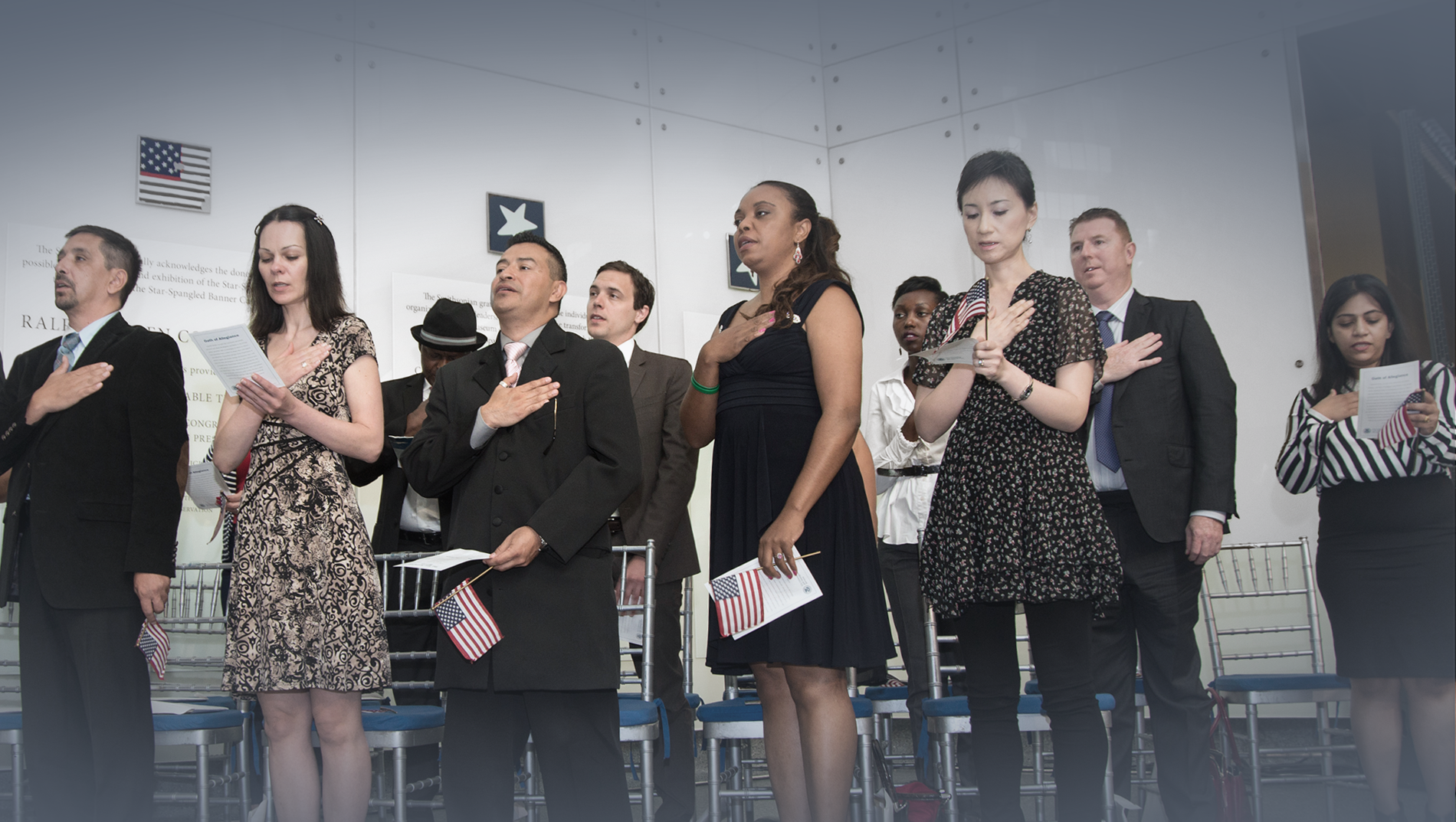Immigration 101
How the United States Immigration System Works
- How the Immigration System Works
- June 23, 2024
U.S. immigration law is very complex, and there is much confusion as to how it works. This fact sheet provides basic information…
Read More
Birthright Citizenship in the United States
- Birthright Citizenship
- October 16, 2024
This fact sheet explains birthright citizenship, the Fourteenth Amendment, and its interpretations. Who is…
Read More
Asylum in the United States
- Asylum
- August 27, 2014
Asylum seekers must navigate a difficult and complex process that can involve multiple government…
Read More
A Look Backward and Forward at Immigration Platforms
Eight years ago, the similarities between the Republican and Democratic platforms on the issue of immigration reform were striking. The 2012 immigration planks for both parties are equally striking, but for the opposite reason. Where 2004 demonstrated a unified vision of a broken system requiring reform, 2012 represents a virtual breakdown in agreement at least in official party documents, on how to go forward on immigration. Comparing the evolution of the platforms from 2004 to 2008 to 2012 offers some insight into what has gone wrong in the immigration policy debate, and demonstrates why both sides need to come up with new, creative solutions to the continuing immigration policy crisis. Read More

Nativist Group Trivializes the 2012 Latino Vote
The nativist Center for Immigration Studies (CIS) has an implicit message for the Republican Party heading into the 2012 elections: stop worrying about Latino voters and just play to your predominantly Anglo base. Such is the kamikaze message contained within a new CIS report, innocuously titled Projecting the 2012 Hispanic Vote. The report dismisses the claims of innumerable analysts that Latino voters could tip the electoral balance one way or the other in the so-called “battleground” states and, by extension, in the nation as a whole. After all, argues CIS, veterans and senior citizens outnumber Latinos in the national electorate, so why not focus on winning them over instead? This may seem comical to some observers, but CIS is saying it with a straight face. Read More

Sore Loser, Jan Brewer, Continues Anti-Immigrant Crusade
Despite losing both the legal and public relations battles in the fight over SB 1070, Arizona’s Governor Jan Brewer was anxious to put Arizona back in the spotlight this week. Although she can’t prevent people from requesting or receiving deferred action, she issued an executive order that attempts to prevent Arizona recipients of Deferred Action for Childhood Arrivals (DACA) from obtaining driver’s licenses in her state. The order, which also banned access to public benefits (something DACA recipients are ineligible for, anyway) has been characterized as mean-spirited and belligerent, but it is also just wrong on the facts Read More

Busting Myths About Deferred Action
Beginning today, undocumented immigrants brought to the country as children may officially submit requests for deferred action, a form of prosecutorial discretion that protects recipients from deportation and allows them to work legally in the United States for up to two years. As might be expected, numerous inaccuracies have surfaced in media coverage and other commentary about the initiative, known formally as Deferred Action for Childhood Arrivals (DACA). Below, we address common falsehoods about deferred action in general and the Obama administration’s initiative in particular. Read More

Nativist Group Publishes a Distorted Portrait of the Foreign-Born Population
The latest report from the Center for Immigration Studies (CIS), Immigrants in the United States, suffers from a bad case of selective statistics. While purporting to be a neutral and scholarly demographic profile of the foreign-born population in the United States, the report is actually an anti-immigrant treatise adorned with charts and bar graphs. On the one hand, the report lumps the native-born children of immigrants in with the immigrant population when tabulating rates of poverty, public-benefits usage, and lack of health insurance among the foreign-born. On the other hand, the report overlooks or minimizes the enormous economic contributions which immigrants make as consumers, entrepreneurs, and innovators. Reading the CIS report, you’d never know that immigrants pay taxes, create new jobs by opening businesses, or make scientific discoveries that transform entire industries. Read More

Using SAVE to Verify Voter Eligibility Comes with Unexplored Risks
The lack of evidence of immigrant voter fraud hasn’t stopped some states from pushing efforts to require photo ID at the polls, purge voter rolls of ineligible voters, and other measures that may result in voter suppression and the disenfranchisement of racial and ethnic minorities or other social groups. Some states have asked the federal government for access to immigration data in order to determine whether non-citizens are on the voter registration rolls. After initial refusals, in July 2012, the Director of USCIS advised the Florida Secretary of State that states, under limited circumstances, may use the Systematic Alien Verification for Entitlements (SAVE) program for verification of the citizenship status of registered voters. Since then, other states have expressed an interest in using SAVE for this purpose. However, the status of SAVE is unclear because the Department of Justice is again challenging Florida’s efforts, claiming they violate the Voting Rights Act of 1965. Read More

Restrictionists Misrepresent Data on Immigration Enforcement
Some members of Congress are intent on portraying the Obama administration as “weak” on immigration enforcement, and they aren’t going to let facts get in their way. Yesterday, for example, the Congressional Research Service (CRS) released new data on individuals who had been identified through Secure Communities (S-Comm) but against whom ICE had not taken enforcement action. House Judiciary Chair Lamar Smith characterized the data as proof that the Obama administration has used prosecutorial discretion “recklessly and to the detriment of the American people.” However, a close look at the data reveals that Smith’s sweeping allegations do not hold water. By misusing terms like “recidivism,” and by failing to distinguish between arrests and convictions, Smith intends to paint immigrants as criminals—a link that has been disproven over and over again. Read More

Voter ID Laws Tackle Non-Existent Problem of Immigrant Vote Fraud
It is election season and voter-fraud hysteria is in the air. A raft of restrictive voter ID legislation from coast to coast is aimed primarily at one imaginary problem: fraudulent voting by immigrants who are not U.S. citizens. Supporters of these laws like to pretend that hordes of non-citizens are stampeding into voting booths and illegally changing the outcome of critical elections. But the reality is that voter ID laws have little to do with the exceedingly rare occurrence of illegal voting by immigrants, or any other kind of voter fraud. These are laws designed to disenfranchise racial and ethnic minorities, the poor, and other social groups that might be inclined to vote for the “wrong” candidates. In other words, voter ID laws are meant to limit democracy, not protect it. Read More

Why Human Trafficking Cases are Falling Through the Cracks
Human trafficking is a big yet commonly overlooked problem in the United States and abroad. Each year, roughly 600,000 to 800,000 people are trafficked across international borders, according to the Department of State, with about 17,500 into the United States. Despite an uptick in laws aimed at addressing this problem, U.S. law enforcement and state prosecutors haven’t identified or prosecuted as many cases as expected given the large number of cases, leaving many to question why. In a recent report, however, experts at the Urban Institute and Northeastern University shed some light on why so many cases seem to be falling through the cracks. Read More

DHS’s NSEERS Program, While Inactive, Continues to Discriminate
For a long time after 9/11, immigration reform was only discussed as a national security issue, and many policies were put in place aimed at stopping terrorists from entering the country. Unfortunately, some of these policies—such as the National Security Entry-Exit Registration System (NSEERS) program—targeted particular ethnic groups, promoted profiling, and resulted in discrimination and civil rights violations. In recent years, the Obama administration has made efforts to end the NSEERS program, but NSEERS still exists and the impact of these policies is still being felt in immigrant communities. In fact, the Rights Working Group, a coalition of civil rights organizations, recently released a report, The NSEERS Effect: A Decade of Racial Profiling, Fear, and Secrecy, which analyzes the continuing impact of this post-9/11 policy. Read More
Make a contribution
Make a direct impact on the lives of immigrants.

